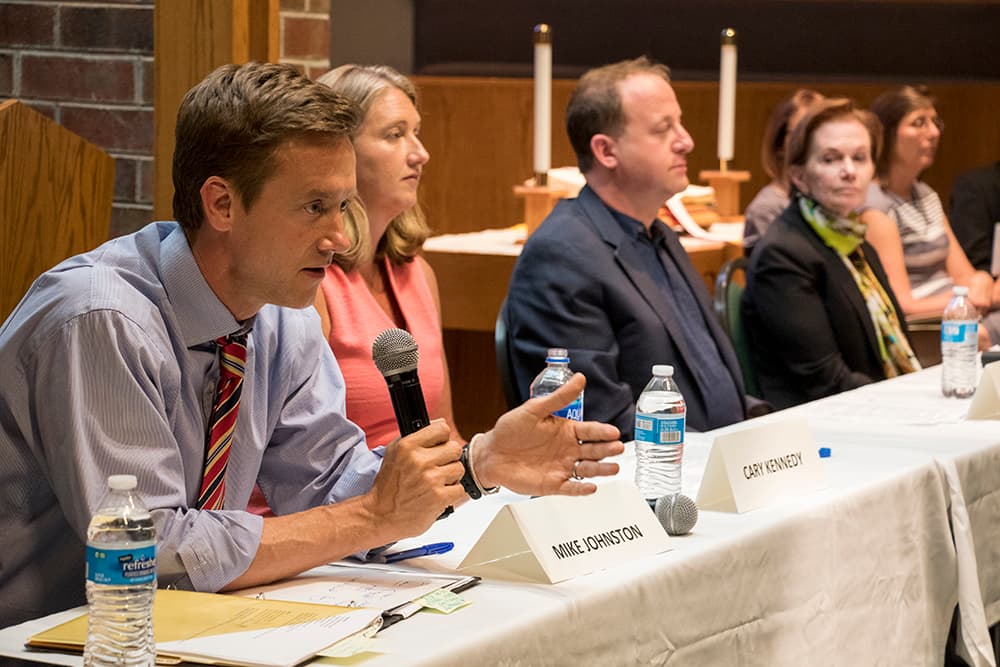There’s a week left before the primary election, but you wouldn’t have guessed that during Monday night’s debate between the four gubernatorial candidates seeking the Democratic ticket.
For a majority of the night, Mike Johnston, Cary Kennedy, Lt. Gov. Donna Lynne and U.S. Rep. Jared Polis faced similar questions (resulting in similar responses) as in previous debates and forums. There didn't seem to be any sense of urgency, yet despite the similarities to previous meetings between the four, there were a few instances where we got to hear some fresh thoughts from the candidates.
Here are three takeaways from Monday’s debate (and you can watch the whole thing here).
The candidates think it’s time for some campaign finance reform.
A question about campaign finance, a topic we hadn’t hear much from the candidates before, was more or less a set-up for three candidates to criticize Polis, who has pumped $10 million into his campaign. It prompted the most interesting exchanges of the night.
Lynne had the best line of the segment, perhaps even the debate, firmly declaring “I think this election’s for sale.” She said she would support limits on individual and aggregate contributions. She said “individuals” are trying to buy it, without specifying whom.
When asked if he believed that you need to be a millionaire to run for governor, Polis said he hoped not. He said there needs to be campaign finance reform since most people in the state are “frustrated” because they either have to be a millionaire or know a millionaire or someone representing a special interest to run. He said PACs need to be eliminated and also took a swipe at Johnston, whose PAC received a donation from billionaire ex-New York City Mayor Michael Bloomberg, and his out-of-state donations.
Kennedy, after being asked if she believed Polis was trying to buy the governor’s seat, noted how Polis had spent more money in the race than the combined amount candidates spent in the last gubernatorial race. She said she would support publicly-financed campaigns.
“This election, this campaign, is exactly what is wrong with campaign finance in this country,” Kennedy said, calling out Polis for self-funding and Johnston for his out-of-state contributions.
Johnston claimed his campaign has the most small-donation donors than any candidate in the race. He said he was proud of the Bloomberg donation because he said it was due to his stance on firearms. The claim was a set-up to call out Polis for his previous decision not to support an assault-style firearm ban in Congress.
"I think the challenge is if you're going to advocate for campaign finance, without yourself stopping funding your own campaign that just means that you can buy-in while no one else can raise any money," Johnston said, speaking to Polis.
This prompted a quip from Polis: "Look, if you didn't have all these out-of-state donors, I wouldn't have needed to put in my own money to keep up with you. Money begets money. You gotta compete to get your message out."
All four candidates think the current drilling setback distances aren't enough.
The candidates agreed that the current 500-foot setback between drilling and homes isn't far enough. Lynne said she doesn't necessarily support the 2,500-foot distance proposed by a ballot measure, but she does want to see it expanded.
Kennedy said the current setback distances aren't adequate and technology should be used to move wells further away from schools, public parks and playgrounds. She would like to allow local jurisdictions to decide whether to increase the distance.
Similarly, Johnston said 500 isn't far enough but 2,500 is too far. He said more needs to be done to address abandoned wells he said could be leaking gases into buildings, potentially causing serious issues. He would like statewide rules enforcing setback distances.
Polis, who has clashed with oil and gas interests in the past, said he would support a setback distance of 2,000 feet for places with no surface use agreement. He said the distances need to be determined by science and objective research.
The candidates want to repeal the death penalty, with Lynne notably disagreeing with her current boss' decision on a high-profile case.
Gov. John Hickenlooper granted convicted killer Nathan Dunlap a stay of execution in May 2013.
Dunlap, convicted of killing four people in 1996, was scheduled to be executed sometime in August 2013. When asked a yes-or-no question on whether they agreed with Hickenlooper's decision, Lynne was the most vocal opponent, shouting "no," while Kennedy followed by also saying she disagreed with the governor's decision.
All four supported repealing the death penalty, though Johnston and Polis didn't say whether they supported Hick's decision. Polis said he didn't think it was appropriate to talk about a specific case since they didn't know the facts of the case — except maybe Lynne.
"I answered no," Lynne said, prompting some laughter.












